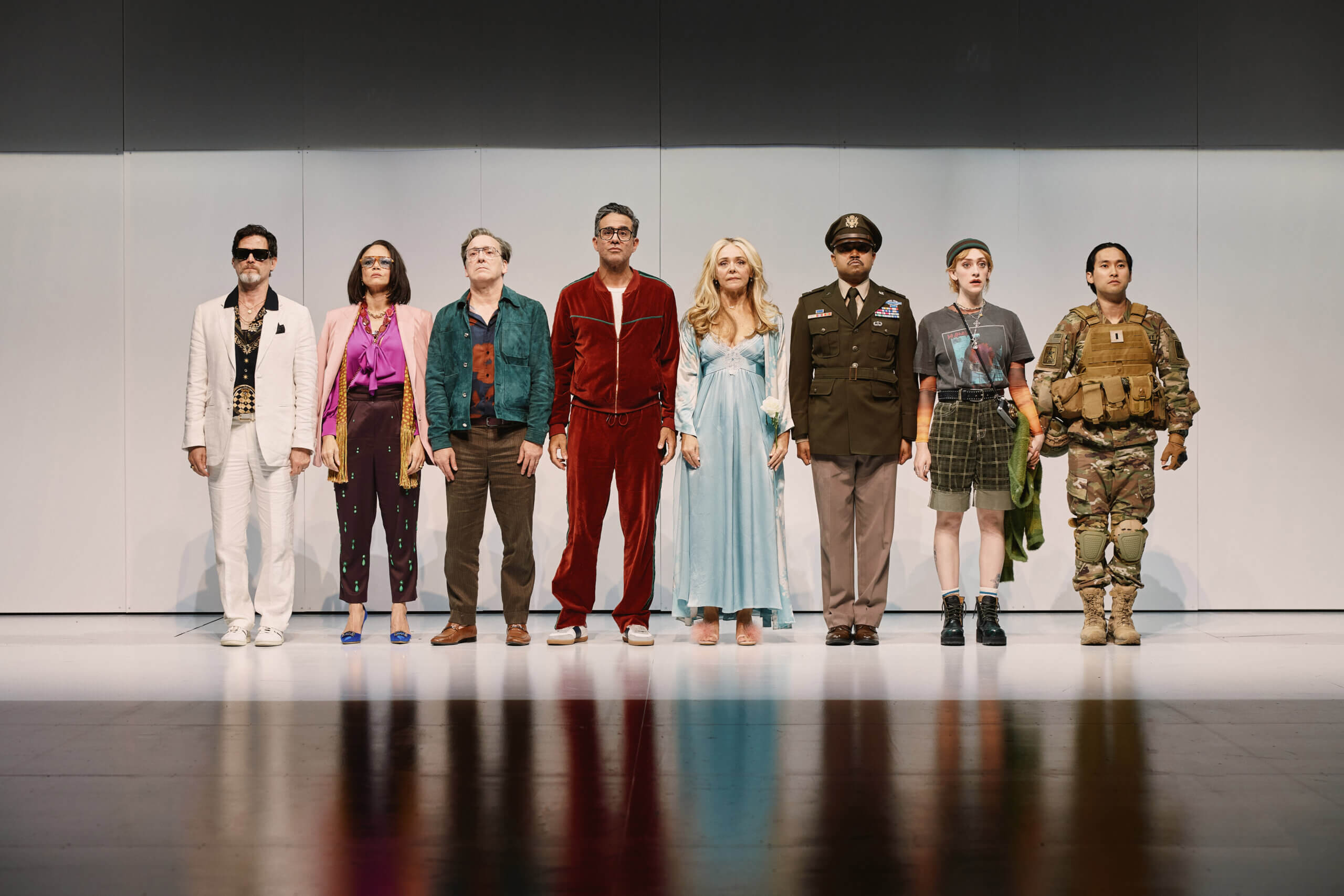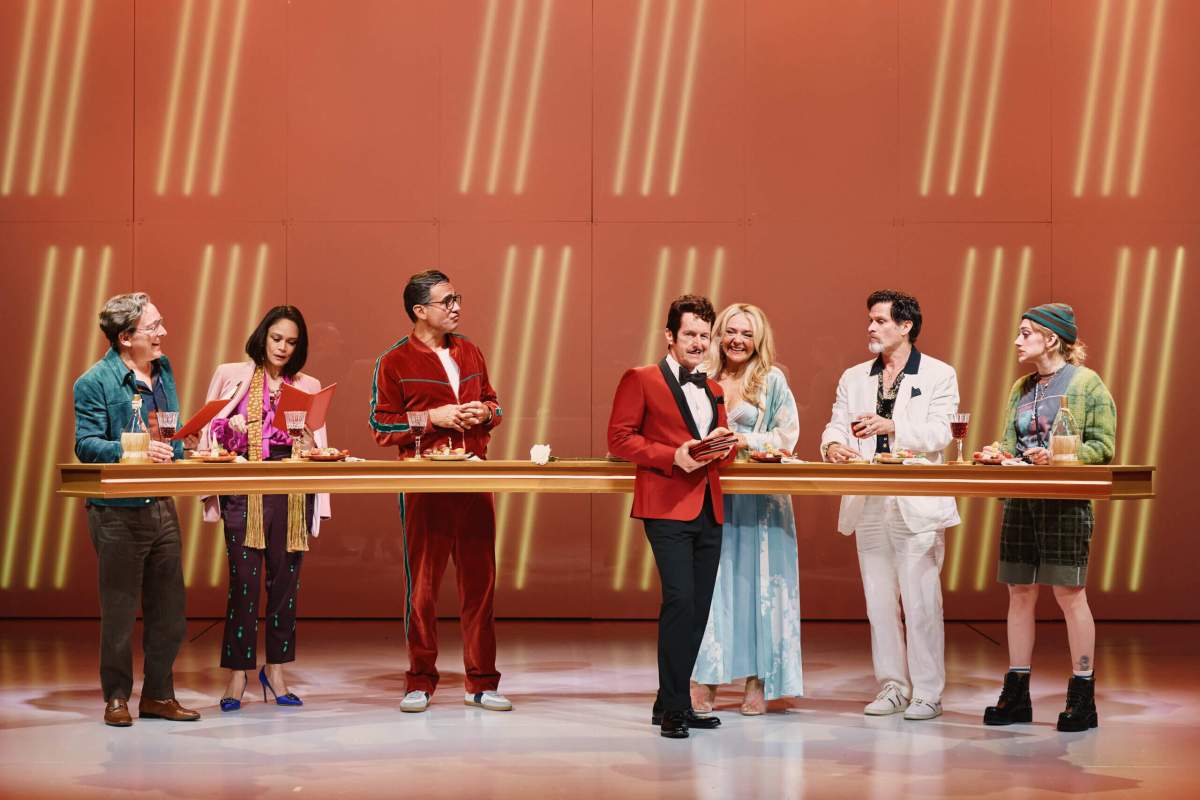Sondheim’s final musical is unfinished and underpowered.
“You’re always sorry, you’re always grateful,” a character explains about being married in “Company,” the game-changing 1970 musical that inaugurated a tremendous two-decade period in which composer-lyricist Stephen Sondheim reconceived and revitalized American musical theater in shows such as “Follies,” “Sweeney Todd,” “Sunday in the Park with George,” “Into the Woods,” and “Assassins.”
I felt particularly “sorry grateful” at “Here We Are,” Sondheim’s final musical: sorry that Sondheim died two years ago, at the age of 91, before finishing the musical; sorry that “Here We Are” is a relatively weak, underpowered, sketch-like work; and as grateful as ever for Sondheim’s unparalleled other musicals.
“Here We Are” is receiving its world premiere in an Off-Broadway production at the Shed in Hudson Yards, with direction by Joe Mantello (who staged the superb 2004 Broadway premiere of “Assassins”) and a mighty impressive ensemble cast that includes David Hyde Pierce, Bobby Cannavale, Steven Pasquale, Denis O’Hare, Micaela Diamond, Rachel Bay Jones, and Tracie Bennett.
During his later years, in between attending countless galas in his honor, Sondheim struggled to create new work. Sondheim spent a decade toiling on “Road Show,” his musical about the Mizner brothers, which underwent multiple titles and directors before finally receiving a deflated Off-Broadway debut in 2008.
Sondheim then spent years working with playwright David Ives on one musical that they ultimately abandoned (apparently concerned that it was too similar in concept to another show) and then “Here We Are,” which is inspired by two experimental films by Luis Buñuel.

In “Finale: Late Night Conversations with Stephen Sondheim,” a newly published series of interviews between writer D.T. Max and Sondheim conducted between 2016 and 2019, Sondheim was reluctant to discuss his progress on “Here We Go” (which was then referred to as “Buñuel”) and acknowledged that the writing process had been slow and challenging.
In their final interview, when Max asked about the status of “Bunuel,” Sondheim said “I’m having a lot of trouble with that stuff. That’s too depressing to talk about…Maybe it’s ‘Buñuel’ and maybe it’s age…It’s a combination of ‘Buñuel’ and age.”
In the first act (based on “The Discreet Charm of the Bourgeoisie”), an eccentric group of people, including rich couples, military officials, a foreign diplomat, a defiant young woman who seems to have come out of the “Occupy Wall Street” movement, and a priest, search for a place to eat. The waiters, in turn, reveal that they have no food left. If not necessarily compelling, it is merrily quirky and often interesting, with jagged chords and intricately rhythmic exchanges.
The second act (based on “The Exterminating Angel”) shows how the characters, after having finally found a place to eat, are unable to leave for unexplained reasons, causing tension, hostility, and hunger. It has only two songs (which the characters indirectly acknowledge, declaring that “the piano is dead”) and is altogether static, empty, and dreary.
Sondheim and Ives lose the mysterious aura of the films in reconceiving the characters (who nevertheless remain thin and undeveloped) and by attempting to inject humor and plot devices.
“Here We Are” probably did not merit a full-scale, sleek, starry production – but I suppose that it had to be produced posthumously anyway in tribute to Sondheim, and diehard Sondheim fans such as myself feel as if they have an obligation to check it out.
I suspect that “Here We Are” will not transfer to Broadway and will ultimately become a minor footnote in Sondheim’s unparalleled career, along with his other late works such as “Road Show” and the updated 2004 version of “The Frogs.” But then again, back in 1981, who would have imagined that “Merrily We Roll Along” would return to Broadway four decades later as a critical and commercial smash?
The Shed, 545 W. 30th St., theshed.org. Through Jan. 21.
Read more: Manhattan’s First Public Beach Opens at Hudson River Park






























